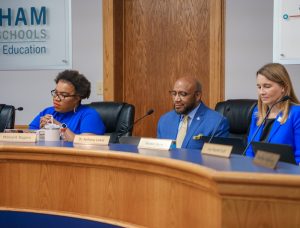Durham high schoolers might gain a precious extra hour of sleep this year, but it’s come at a cost to hundreds of younger students.
This month, the Durham Public Schools Board of Education approved a new districtwide bell schedule for the 2022-23 school year. It standardizes start times in a three-tier system; elementary schools will now begin at 7:45 a.m., middle schools at 8:30 a.m. and high schools at 9:15 a.m..
Though older students stand to benefit most from this change, it’s had unintended consequences. With elementary schools ending at 2:15 p.m.— early for many working families— more than 700 students have been left without reliable after-school childcare.
The board first began researching later start times for adolescents in 2015, said school board member Natalie Beyer. The scientific evidence is robust; both the federal Centers for Disease Control and Prevention and the American Pediatrics Association have found that, due to biological changes that occur during puberty, teenagers perform best when school starts at 8:30 or later. Districts across the country have also begun making the switch. For instance, in 2019, California became the first state to legislate later start times.
“We had high schools and middle schools starting as early as 7:25 in Durham and knew that that wasn’t really in keeping with adolescent sleep,” said Beyer, whose three children attended DPS schools.
According to the July 14 release, the new schedule will also increase the efficiency of bus routes.
However, it has created an overflowing demand for childcare. The new schedule has worsened a critical staffing shortage that first arose during the pandemic. With 42 staff vacancies for after-school caregiver positions, DPS lacks the personnel to attend to nearly 900 currently enrolled students.
And that figure doesn’t even account for the 721 students on the waitlist. To accommodate them, the district must recruit an additional 55 employees.
Scott Capouch, a father of two, is one of many parents left in limbo by the schedule change. He fears that with start times before 8 a.m., his sons will get less sleep and have a poorer quality of education when they enter kindergarten and third grade at E.K. Powe Elementary School this fall.
“It just feels like a lot of these decisions aren’t made in the best interest of young children,” Capouch said. He and his wife, who both work full-time, had previously relied on E.K. Powe’s program for after-school childcare. This year, only one of their sons made it off the waitlist. “I just think that the most vulnerable portion of the school system is the one getting the short straw right now.”
So far, hiring efforts have largely focused on retirees and college students. But with wages at $16 an hour, the district hasn’t been successful, even with an added $2,000 bonus. At one of two July 25 town hall meetings, about two dozen parents gathered to discuss the employee shortage and brainstorm solutions. The sessions took place at 10 a.m. and 6 p.m. that Monday.
That morning, parents and administrators broke into groups to exchange and share ideas. Participants suggested ramping up targeted advertisements, providing clear-cut pathways for career advancement within the school system and guaranteeing flexible employment hours.
Capouch, who attended the evening meeting, feels that the burden of filling staff vacancies shouldn’t fall on parents. “Shouldn’t you be the ones who know how to handle this?” he said the following day. “Why are you looking to us? I work as a home inspector— am I the one that should be trying to figure out how to recruit after-school care employees?”
Tracey Super-Edwards, director of community education for the school system, said after the meeting that increased childcare needs were “taken into consideration” when determining the new bell schedule. But until the district can hire the necessary staff, families on the waitlist can look to resources outside the school district, she said.
“On our website, we have a list of other providers in the community that families can reach out to, such as the Child Care Services Association,” she said. The association offers referrals to various programs in the area and also provides information about funding resources for families.
Super-Edwards also encouraged parents to spread the word about the open positions, calling them the district’s “biggest advocates” in staff recruitment. “We hear [the parents], we’re empathetic,” she said. “But we’re doing our best to try to find staff because we want them to be in our programs.”
District leadership will continue active recruitment efforts, drawing on suggestions from Monday’s meetings. Super-Edwards said DPS hopes to bolster its employee referral program (offering $200 to staff members who successfully recruit workers), facilitate connections with local universities and involve community partners such as the YMCA and Durham parks and recreation. The district may also increase the frequency of bonuses for after-school workers.
As the summer draws to a close, parents must race against the clock to find care for their little ones. High schoolers, on the other hand, will be able to hit snooze one last time before the first bell.
Above: A Durham elementary school readies for incoming students. Photo by Maddie Wray — The 9th Street Journal





